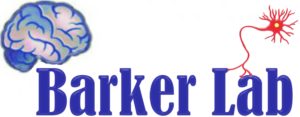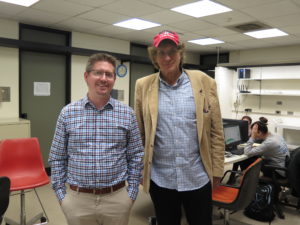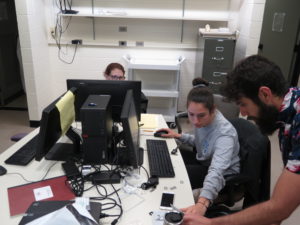NJ DISCOVER SPOTLIGHT INTERVIEW: YOUR Brain: Research: Meet David Barker, PhD. Rutgers Psychology, The Barker Lab, Assistant Professor. By Calvin Schwartz June 25th 2019 


The first time met Dr David Barker on College Avenue coffee shop
Linked In. May 19th. A connection with Dr. David Barker based on Rutgers commonality. A few introductory messages. Eleven days later, coffee on College Avenue. Then June 13th, rainy morning, sunny afternoon at Department of Psychology, third floor, Rutgers University. Fast connectivity. Almost like firing neurons.
Back on College Avenue, Dr. Barker and I talked about the brain, addiction, his research, how I arrived in journalism, Arizona, football, The National Institutes of Health, The Barker Lab. All foundations for furthering my knowledge, curiosity.
I suggested, “Let’s do a real sit-down interview.” “Anytime,” Dr. Barker responded.
Somehow, before we finished coffee, we segued into a discussion of addiction in New Jersey; demographics, incidences, things learned. It was unfinished. Then we drifted into a succession of relevant and irrelevant tangents.
“To be continued,” parting words in the parking lot behind the Student Center.

Home of Barker Lab Rutgers Psychology Piscataway
INTERVIEW:
Dr. Barker immediately asked, “How do you want to do this interview?” “Right here, right now.” Two plus hours disappeared sitting in his office. Then he added, “Remember our discussion on New Jersey counties and addiction from our coffee shop chat? Here is a graphic to follow-up.” How thorough. Before looking, I suggested Camden County might have a high incidence. It did. And so did rural Gloucester County adjacent. David (Dr. Barker) explained, “New Jersey shows some very rich and poor counties with high rates of drug overdose. It really shows you how many people drug addiction affects …. And look at the spike upwards of addiction in many counties starting from 2008 coinciding with the deep recession. We’ve never really recovered”
The night before, my due journalistic diligence, researching Dr. Barker. “Why Rutgers? I know you were undergrad at Arizona State?” “From day one at ASU, I knew it was psychology; clinical, cognitive, social, behavioral, social science. It took me a while to find the right place within psychology, though. I worked with kids with autism, shadowed school psychologists, etc. Finally, I took a class with Dr. Michael Palmer on the foundations of behavioral psychology and I was hooked. I’ve always been the type of person that can sit and watch people all day. After this course it dawned on me that the reason for this is that I love the psychology of human and animal behavior. Soon after, I got into a lab with Dr. Peter Killeen (right up there with B.F. Skinner) working with rats and pigeons. He became an incredible mentor, convinced me I can and needed to do neuroscience.”


David applied to several graduate schools, but knew Rutgers was the one when he visited the lab of Professor Mark West. “I saw the way that rats behaved on cocaine and just how hard they worked to get it. Then I was hooked! I needed to know what parts of the brain worked to drive this kind of behavior”
Early on in the interview, I mentioned my streams of consciousness which means I’m prone to jump around seemingly unorganized. Dr. Barker laughed. Suddenly, I asked about a recent news item that linked use of antidepressants to increased risk of dementia. “I’m not aware of this, but it doesn’t surprise me. Figuring out the brain is not a Jigsaw puzzle but a Rubik’s Cube; sometimes you feel like you have one part figured out only to mess up another; the brain is incredibly complicated.”

with Phillip Darias, Lab Manager
In 2014, after earning his PhD, Dr. Barker went to work at National Institute on Drug Abuse in Baltimore. “I reinvented myself…. Switched from rats to mice.” “Why mice?” I asked. “With mice, we can do all kinds of genetic targeting, which allows us to understand the brain at a deeper level. Knowing the identity of each neuron and how it’s connected across the brain provides us with such a wealth of information. Just think about how much you can find out about a person these days using their name and address. This is what I try to do with the brain.”
In January, 2019 David arrived with family at Rutgers University and set up The Barker Lab (brain research) and became an Assistant Professor in the Department of Psychology. Thinking of Psychology, I went off on another tangent. “Is Pavlov, one of my enduring heroes, relevant today?” “His foundations of conditioned behavior are as important as ever.”
Another tangent jump. I commented to Dr. Barker, I couldn’t even understand a “simple” one sentence description of his recent publications and I have two Pharmacy degrees from Rutgers. https://www.thebarkerlab.com/ And at Barker Lab website, there are several descriptions of new ‘Approaches.’ One caught my eye. “Single-Cell Calcium Imaging” I told about a recent calcium C2 scan of my coronary arteries, which yielded ZERO plaque. “Please tell me about calcium imaging.”

Mice Breeding Feeding Sleeping
“Calcium imaging is relatively new. At the neuron level there are calcium changes when a neuron is communicating with other neurons. It’s a proxy for when neurons are activated.” I stopped him. “Don’t need any more info. My head is at absorptive limits.” He laughed.
“Ready for another stream of consciousness?” I told Dr. Barker my story of fascination with Ray Kurzweil, Singularity and attending a futuristic conference some years ago in NYC. “There was a Russian scientist who predicted in 30 or 50 years, the ability to transfer the entire essence of a brain to a cyborg Terminator entity, thereby securing immorality. Any comments?” His broad smile turned serious. “Think of any great sci-fi film that has projected what a date that has already passed would look like… 2001, Hal. Back to the Future. They get some pieces right, but mostly they have it all wrong. It’s exciting studying the brain, but we’re so far away from knowing how the brain processes information. This is why basic research is so very important and why we fund so much of it. That being said, my personal opinion is that we won’t be downloading anyone’s thoughts in the next 50 years.”

with Dr. Barker post interview. Thanks to Linked In for the introduction
I jumped tangentially again. Neurons firing away. Excited to be sitting with a brain researcher. Thinking I could get many of my long-standing questions answered. “What about Highly Superior Autobiographical Memory, when people recall specific details of life’s events and think about their past all the time with incredible detail. I’m curious because strange things pop into my head so randomly often.”
“People with unique abilities are as interesting to me as they are to you. Truth be told, we don’t know how memory works or how memories are stored in the brain. What’s most intriguing to me is that we all have nearly identical brains, at least in terms of the structures and cells…The holy grail of neuroscience research is figuring out how brains hold and use information in order to allow us to be as individualized as we are.”

oscilloscope
“Let’s talk about The Barker Lab, it’s goals. No more jumping around.” “With drug addiction (our focus), we need to understand the brain. Drug addiction is a disease that causes a person’s brain to work differently than a healthy brain. If we want to understand what changes when an individual becomes affected by drug addiction, we first need to understand how neurons process information in the first place. The work my lab performs to increase our understand of just how the brain does this is called ‘systems neuroscience’. In systems neuroscience, we try to explain how the brain is working by identifying who certain neurons are, how they are connected together, and what their jobs might be, all at the same time. For me, I feel like this gives us the best chance of understanding the brain. Using my analogy from before, you can learn a lot about a person using their name and address… Now think about how much more you can learn if you also have their social security number and date of birth. The more information we have, the better we can explain what’s going on in the brain. For my lab, we do all of this within the framework of drug addiction, but the things we learn can likely be applied to all kinds of brain diseases.”

“Some research you’re doing now?” “We’re looking at the hypothalamus, which is typically thought of as a part of the body that keeps us in balance. The hypothalamus communicates with the body and is involved in heart rate, feeding and even emotions. For me I’m curious how abused drugs might disrupt this balance, especially when it comes to emotions”
“Fight or fight,” I interrupted.
“Exactly,” Barker almost shouted. I felt smart, almost.
Briefly discussed, Psychiatric hospitals and their disappearance. I asked, “Are we doing a better job today than we were back then?” “It’s complicated”, David responded. “We’re still fighting against the stigma of mental illness and, while we’ve come a long way, we still need better acceptance for the fact that mental illnesses like drug addiction are diseases.”
Next, Dr. Barker praised Nora Volkow, a Mexican-born naturalized American psychiatrist. She is currently the director of the National Institute on Drug Abuse, which is part of the National Institutes of Health. Volkow is the first person from the NIH to visit the Dalai Lama at his residence in Dharamshala, Himachal Pradesh, India. “She is doing an incredible job informing Congress. We’re doing better with mental health and policy for drug addiction in large part due to her leadership.”

working on medicine delivery

When we first met for coffee, we discovered some of our commonalities; Sedona, Arizona, football. We share a love for the game. We reminisced when Rutgers played David’s undergrad alma-mater Arizona State in the 2005 Insight Bowl. Of course, the segue to chronic traumatic encephalopathy (CTE); the brain condition associated with repeated blows to the head and football. We worried together.
Two hours banked. Dr. David Barker was engrossing, captivating, charming, effusive, knowledgeable beyond, dedicated, passionate. Easily another two hours could’ve been spent but we agreed we’re on to something productively, jointly communicative which simply means more projects together down a brick Piscataway road. I’ve been saying for my last six years as an NJ Discover journalist, that more people out there in Jersey and beyond should know about the great academic, research ‘things’ happening on the banks of the Raritan at Rutgers. It’s a journey.

MICE MAZE
“Hey David, before we take a tour of The Barker Lab, how about lightening the air in your office? Fun questions to solidify a portrait.”
“Sure.”
“Before I leave this earth, I won’t be satisfied until I……………?
“I see my kids realize their dreams like I did mine.”
“Living or Dead, who’d you like to have dinner with?”
“Ed Boyden, one of the founders of Optogenetics. His mind has always inspired me and I’d love to talk about how he approaches his new ideas.”
“Finally, five things you can’t live without.”
“My family, music (I play percussion), my work, (I love what I do) football and hot wings.”
“Hot wings as in eating?”
“Yes.”
And we were off to see this incredible Barker Lab. Pictures attached. Elevator to first floor. My brain was swimming in excitatory neurons all the way home down Route 18. A perfect cerebral day. My handle. Cerebral writer.
Follow David on Twitter @DavidBarker_PhD
NOTE: “ I’m always happy to engage with the public to answer questions and things.” Dr David Barker
THEREFORE, IF YOU HAVE QUESTIONS PLEASE CONTACT DR. BARKER.





